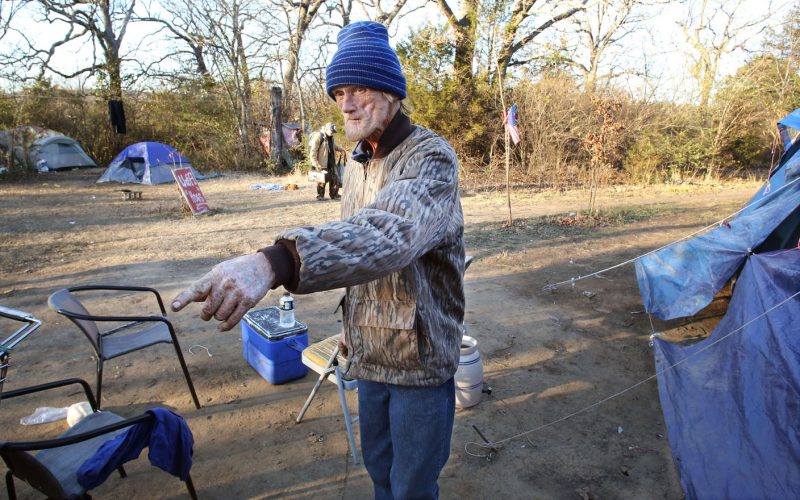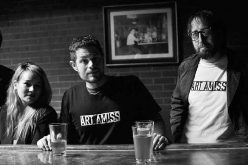The 7 Hills Homeless Center’s move to the southern part of Fayetteville has done a lot of good for the area while bringing some drawbacks, members, neighbors and other city residents say.
It’s been two years since 7 Hills moved its day center from West Martin Luther King Jr. Boulevard to South School Avenue a little more than a mile away to allow more space for services and easier access for clients.
More than 500 people in a typical month use the showers and laundry, pick up breakfast or coffee, and get leads on jobs and housing, operations director Solomon Burchfield said in November.
The number of clients seems to tick upward each month, Burchfield said, so the center has doubled its food pantry and is expanding its laundry. Outside, the center put in a new bus stop shelter, while the city kicked in about $85,000 to improve the sidewalk.
“We’re just trying to improve the walkability there in the south part of town,” Fayetteville assistant transportation manager Keith Shreve said, adding the city’s looking at similar improvements along much of South School. “We knew there’d be a lot of usage for that sidewalk.”
The changes are part of a complicated picture of how well the day center and its neighborhood are adjusting to each other.
On the positive side, the School Avenue location in many ways is ideal for 7 Hills’ work, Burchfield and Capt. Joshua Robinett with the Salvation Army of Northwest Arkansas said. The two groups often refer clients to each other and offer services that the other can’t, Robinett said.
The Salvation Army’s emergency shelter, the poverty-focused nonprofit group LifeSource International, low-cost housing, 7 Hills’ transitional apartments and trails are all nearby. The center is further from the busy traffic on King Boulevard. Many clients or former clients who volunteer at the center have said they use the trail to get there.
George Santhuff has lived in a tent on the western side of the city and has been going to 7 Hills for more than four years, so the move added distance for him and others, he said. But the trail helps, and the location has more outside space for parking and tables. On balance, “it’s not all that much different,” he said.
Businesses near 15th Street, just north of the day center, said they value the help the day center provides for people in need. If anything, the center and its clients have been pushed too far away from job opportunities in the middle of town, said Adrienne Shaunfield, who co-owns The Farmer’s Table Cafe.
“I think it’s super important that they have a place,” she said.
On the other hand, the influx of people has sparked safety and environmental concerns from some neighbors.
Carole Jones has lived for almost 20 years just down the road. She supports the group’s goals and said Northwest Arkansas must build more facilities and shelters to prevent homelessness. But she won’t ride her bicycle alone in the evening on the nearby stretch of the Razorback Greenway, as she once did on warm nights, because there are so many more people on the trail since the day center arrived.
“The biggest problem I have is the trash,” she said, especially near Town Branch Creek.
The Mr. Taco Loco restaurant has been open for a little more than a year across the street from the day center and no longer serves customers who appear intoxicated or unkempt because they caused too many disruptions, manager Cristian Valle said. But he doesn’t blame 7 Hills itself or expect them to fix that particular concern.
“They’re just there to help the people,” he said.
Homelessness in general is on the rise, according to a biannual survey from the University of Arkansas Community and Family Institute. The 24-hour count in January found almost 3,000 people without stable housing of some kind.
Several residents’ complaints to city officials center on a homeless camp on empty, university-owned land next door to the day center. Several spoke to the Planning Commission in October and November after the Serve NWA nonprofit group proposed building several basic huts that can be transitional housing between the camp and regular apartments.
Kevin Fitzpatrick, a university sociology professor and homelessness researcher leading the effort, said the project could allay neighbors’ concerns by requiring its clients to clean up, for example. The commission approved the permit.
7 Hills CEO Jessica Andrews, who took over in October, said she supported the project’s goals.
“Emergency housing is a huge need here, it really is,” she said.
Burchfield said 7 Hills tries to help with trash concerns by talking with clients, giving out free trash bags and providing a trash bin.
“We try to take care of our relationship with our neighbors,” he said, adding the organization maintains strong working relationships with city and university police.
Two people were found dead at the camp this year, for example. Medical examiners couldn’t determine the cause of death for John Widdoes Jr. University police found no signs of trauma or foul play in the death of Phyllis Thompson.
The homeless population in general is much like any other group of people police interact with, and several police officers know 7 Hills clients by name, department spokesmen said. Fayetteville Police’s Sgt. Anthony Murphy said officers on patrol will sometimes give them rides to the Salvation Army and keep boxes of toiletries and snacks in their vehicles.
Lt. Ben Velasco with university police said he tries to get to know people at the day center and camp and regularly talks with 7 Hills staff members.
“They know their clientele, who’s in and out on a daily basis, who’s having issues,” he said. “It’s always good to go to them first to kind of get a feel for what’s going on.”
University police also aren’t interested in summarily clearing out the camp, Capt. Gary Crain said.
“We’re trying to come up with solutions to the problem, not transfer it,” he said. “They’re going to go somewhere.”






